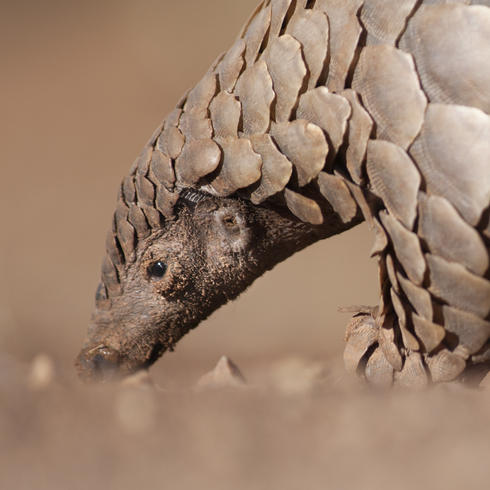Shan children in rural communities have long been seen wearing flat, shell-like pendants on their necks, a hole cut into its surface and hung from a nylon string—the scale of a pangolin, which now bears the distinction of being the most illegally trafficked animal in the world.
It is believed that if children wear a scale of a pangolin as an amulet, they will be protected spiritually. The practice continues today.
“If a pangolin scale necklace is placed on a child’s necks, bad spirits cannot disturb the child,” 50-year-old farmer Sai Punt told SHAN, adding that the body of the pangolin has been used to make traditional medicine. “Our Shan people don’t kill pangolins for eating purposes,” he clarified.

There are the two species in Burma—the Chinese pangolin, manis pentadactyla, and the Malayan pangolin, manis javanica. They are also known as scaly anteaters and are threatened with extinction due to overhunting and the deforestation of their habitats. Their scales, the most valuable part of the animal on the black market, are made from keratin—the same protein as human fingernails—and grow firmer as the animal ages.
There were once many pangolins around Sai Punt’s village in the Shan mountains—the exact location of which has been concealed to protect any surviving pangolins—15 years ago. Locals would try to catch pangolins but say that they would not kill them. When under threat, they roll into a ball, making them easier to subdue.
“Local people would catch pangolins because they wanted a pangolin scale. If people could catch one, people got many scales, so they didn’t need to catch so many pangolins. That’s why there were so many around the villages,” Sai Punt explained.
This changed when traffickers from China and Thailand began buying pangolins.
“The demand is really high. Now it’s rare to see pangolins around our village,” he said.
In July, the UN Office on Drugs and Crime (UNODC) released a report on transnational organized crime in Southeast Asia, describing pangolin populations as having been “decimated,” and estimating that over the past decade, more than a million pangolins have been killed globally.
The UNODC identified pangolin scales as being increasingly used to make luxury products and for herbal medicines. There also has been a greater demand for pangolin meat, a delicacy in China and Vietnam in particular.
With its cooler climate and vast swathes of forest, the Shan mountains have been a known habitat for the nocturnal pangolin. Yet its proximity to China has meant that many of Burma’s pangolins have been hunted and trafficked to Yunnan Province.
Sai Nawng, who once worked as a pangolin hunter in eastern Shan State’s Mong Yawng area, said that pangolins were once a common sight around villages in the area, but have become increasingly rare.
“Sometimes we don’t see a pangolin for a month,” he told SHAN.
However, on September 9, he admitted that he caught one of the animals, weighing more than one viss, a Burmese unit of measurement equaling 3.6 pounds or 1.63 kilograms.
“The current price is 200,000 kyat (US$130) per viss. I called a broker and he immediately came to take it,” Sai Nawng said. However, the scales are often later sold on the black market for thousands of dollars per kilogram.
Pangolins in Mong Yawng are exported to China through Mongla Special Region-4, an area controlled by the National Democratic Alliance Army (NDAA), also known as “the Mongla group.” Mongla is located near the border with China, and is a known hub for wildlife trafficking.
With perpetually increasing militarization and ongoing civil war, the poaching of vulnerable wildlife has taken hold in many of Burma’s conflict areas.
Locals are also often unaware that it is illegal to hunt pangolins, and that they are on the Ministry of Environmental Conservation and Forestry’s “critically endangered species” list, or what the significance is of this classification.
Meanwhile authorities are notorious for not enforcing the laws in place to protect the species.
“If forestry officers arrest pangolin hunters, they need to pay bribes to them. Respective authorities do not effectively take action against it in this area,” former hunter Sai Nawng told SHAN.
According to the UNODC’s recent report, police in Burma have made more than 30 arrests related to pangolin trafficking from 2009 until 2017, seizing a total of 1.2 tons of pangolin parts.
Larger busts included the discovery of more than 93 kilograms of pangolin scales in northern Shan State’s Lashio, in Kachin State’s Tanai, and in Mandalay region over the last three years.

There have been four pangolin-related arrests this year, according to the forest department.
M. Hkaw Hsawng, deputy manager of the environment and animal protection department in Shan State, described the authorities’ action against pangolin traffickers and hunters as “effective,” and pointed to government orders intended to protect pangolins. He said that those found guilty of poaching would be charged with violating Article 37(a) of the wild animal protection law. They can face three to 10 years in prison for buying or selling pangolin parts or eating pangolin meat.
Shan State’s forest department staff said that if they catch pangolins alive, they release them deep into the forest to increase their chances of survival. Dead pangolins or collections of their scales are reportedly incinerated.
The disappearance of pangolins also threatens the ecosystem to which they belong. They are appreciated for their ability to reduce the number of pests in their habitats, including destructive termites.
“Pangolins eat bamboo insects. They eat termites and white ants in the jungle. If there are no pangolins, there will be many more insects in jungle—termites and ants,” Sai Nawng told SHAN.
A solution to the problem of pangolin hunting and trafficking remains elusive, as the forest department demands greater local participation in the protection of endangered wildlife and locals point out that even with laws and regulations in place, poaching continues with impunity in Shan State.












Leave a Comments